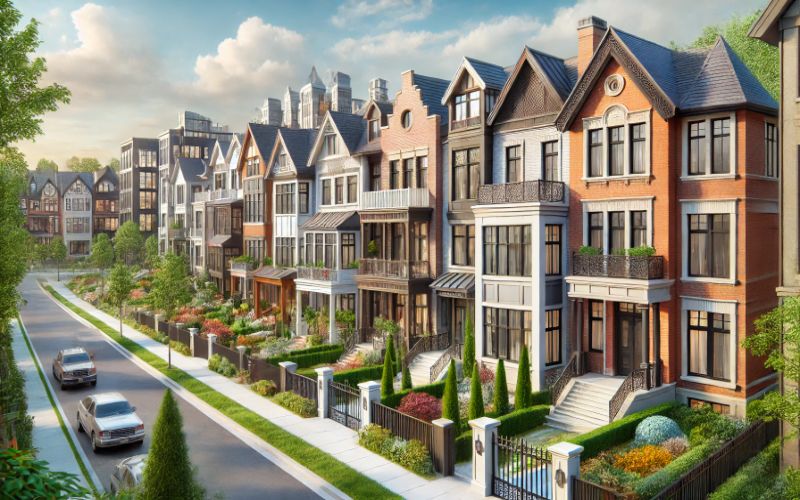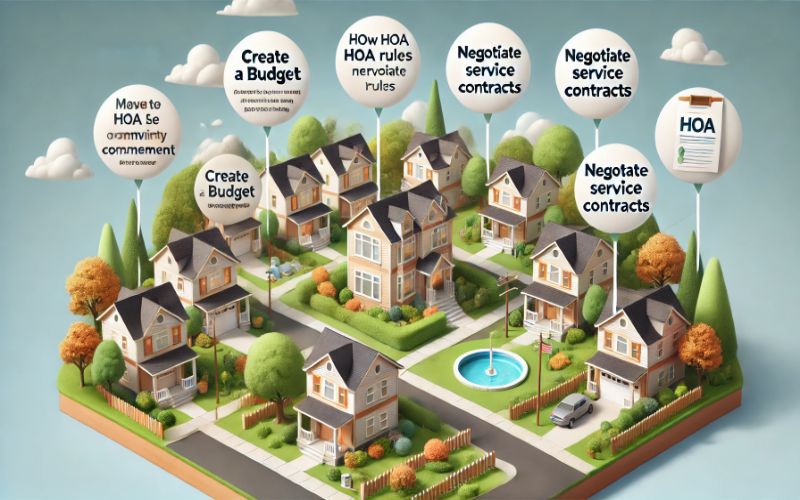Oct 10
What Townhouse Fees Cover and How They Are Calculated
Owning a townhouse requires being aware of the fees you pay and how they're assessed. Townhouse financial management about the community's success is quite important, and fees often include exterior maintenance, landscaping, and shared utilities, among which the specifics vary.
For instance, larger or more luxurious homes usually come with higher fees. It’s important to have transparent financial statements so everyone feels treated fairly.
But what happens if those fees go unpaid? And how are these amounts figured out in the first place? Let’s take a closer look at these important topics.
Types Of Townhouses
Before delving into fees, it’s essential to understand the different types of townhouses available. Each type comes with its unique benefits and responsibilities, influencing your overall living experience.

Freehold Townhouses
Here, you fully control your freehold property. You can disregard monthly fees, and if you want to do everything alone regarding maintenance and landscaping, then this is ideal. It simply means that you have to do everything by yourself when it comes to upkeep, enabling you to put your house in the perfect style that you'd want for it.
Condo townhouses
These are about 20% cheaper than freehold townhouses. They entail monthly fees, but they comprise the exterior upkeep and maintenance. This may be a convenient option if you do not want to be bothered much. Condo townhouses usually have rules and regulations that favor uniformity and community upkeep.
Stacked Townhouses
This is another fascinating form of townhouse ownership. The units are vertically stacked and come with separate ownership to benefit each owner, who gains private and secure access. This type of housing thus features a beautiful blend of condo living with a little privacy.
What Is The Average Cost Of Maintenance Fees?
The cost follows the maintenance charges. The townhouse fees in Toronto are about $0.50 per square foot per month. These basic fees pay for necessary services such as exterior maintenance, landscaping, snow removal, and repairs to common areas.
The size impact also significantly affects the aggregate cost of all these fees. Generally, the size of your townhouse will determine the fees you should expect to pay; the larger the unit, the higher the fee. The costs are usually computed based on the total square footage of all the townhouse units within the complex.
How Are Townhouse Fees Calculated?
operating budget of the townhouse community. The board or homeowners association (HOA) reviews this budget to figure out how much money is needed to cover shared costs. Several factors play into this calculation, including the number of units in the complex, the size of your townhouse, and the amenities available.
Here are some key factors that can affect your townhouse fees:
- Complex Size: In general, larger complexes with more units can charge less per unit. This is because costs are spread out among more homeowners, making it more affordable for everyone.
- Size of Your Unit: Typically, townhouse fees are based on the square footage of your unit. This means that larger homes will pay more since they’re responsible for a bigger share of the overall expenses.
- Age of the Building: Older buildings often require more maintenance and repairs. As a result, fees may be higher to cover these increased upkeep costs.
- Amenities: If your complex offers appealing facilities like a gym, pool, or concierge services, you can expect higher fees. These amenities come with added expenses that need to be covered.
What Does Townhouse Fee Cover?
Townhouse fees play a vital role in keeping your community running smoothly and looking great. They cover a range of shared services and responsibilities that make your living experience enjoyable and hassle-free. Understanding what goes into these fees can help you appreciate how your home and community are maintained.
Here’s a closer look at what these fees typically cover:
Common Area Maintenance
Good townhouse complex financial management often caters to maintaining common areas like hallways, lobbies, and recreational spaces. Townhouse fees usually cover cleaning, landscaping, and repairs. This should include common areas so they remain maintained and aesthetic. This aspect is necessary for improving the value of the property and goes hand in hand with the demand for well-kept communities.
Exterior Maintenance
External maintenance usually would be added for condo townhouses. This will include roof repair, window replacement, and exterior painting, among other costly repairs needed. These are all part of the HOA's overall strategic management approach to ensure the long-term durability of the property. This is not that common for freehold townhouses unless shared community responsibilities are involved. Still, strategic planning beforehand for future repairs should be adopted in order not to incur surprise costs.
Snow Removal and Landscaping
For a town that experiences extreme weather conditions, snow removal and landscaping may be included among the townhouse fees to be settled. Snow removal during winter and landscaping in the warmer months ensures the community is kept neat and clean. This is part of property development, maintaining the values of properties in order and simplifying so many things for the house owners.
Building Insurance
A condo townhouse typically pays fees that contain building insurance for the structure and common areas. This is apart from your home insurance, which automatically covers your interior and personal belongings. Check all the details on coverage so as not to doubly pay for it and ensure that you are managing your finances well. This type of insurance sets strategies in place so that the community will be better prepared financially in case of large unexpected repairs or incidents, and it goes with the new current market trend that promotes full insurance coverage.
Reserve Funds and Repair
Most townhouse charges flow to a reserve fund, where any major or unexpected expenditures will be paid. These include replacing HVAC systems or correcting structural damage. A well-funded reserve appears to be the result of good strategic planning and sound financial foresight on the part of the property management team. Good economic management is healthy in a good reserve fund, which avoids sudden increases in fees brought about by emergency repairs.
Utilities
Many condominium townhouse associations include utilities like heating, water, and trash collection in townhouse fees. This saves residents the complexity of managing many utility bills because they are all wrapped up in the payment. However, verifying this is necessary to ensure the right budget is made. Knowledge about utility coverage is essential to planning practically and managing one's monthly expenses wisely as per the current market.
Amenities
Townhouse complexes with mutual amenities, such as a gym, pool, and party room, will have portions of fees used to keep up with those facilities. They can add value or enhance the quality of life of a property; however, it will require a good system that plans for future sustainability. This is based on the current market trends, where promising luxurious facilities would be meant to coax the sellers, yet sustainability has to be planned in the long run.
What Do Townhouse Fees Exclude
Understanding what townhouse fees don’t cover is just as important as knowing what they do. While these fees typically include essential services like exterior maintenance, landscaping, snow removal, and upkeep of common areas, there are a few exclusions you should be aware of to avoid any unexpected expenses.
Here are some common items that townhouse fees usually don’t include:
- Interior improvements: Any makeover or renovation in your townhouse, including replacing a kitchen or bathroom, is your responsibility.
- Maintenance of personal property: Maintaining all your personal belongings, from furniture and appliances to other personal property items, to be in proper working condition is not part of the list.
- Interior repairs: You are responsible for anything related to plumbing, electrical systems, heating, ventilation, or air conditioning systems in your townhouse.
- Utilities: The monthly charge for water, electricity, gas, and internet use usually is not included in the package for your townhouse.
Tips To Manage Townhouse Fees
Managing townhouse fees can feel overwhelming, but staying informed and proactive can make a big difference. By keeping a close eye on your financial responsibilities and engaging with your condo association, you can better navigate any potential challenges.
Here are some practical tips to help you effectively manage your townhouse fees:

- Read and analyze your fee breakouts constantly to keep track of them. This will keep you updated about the exact use of your money and help you spot fee inconsistencies early in the game.
- Plan and save some money in anticipation of probable fee hikes. This will prevent surprise fee hikes.
- The advantage of being an active participant in your condo association is having a say in fee determination and management. Attend your meetings, state your opinion, and be part of the negotiations when fees arise, and disputes over how much is owed arise. This active involvement may provide insight into strategies the association will consider regarding cost savings and reduced fees.
- Communicate effectively with your association. Do not fear reaching out if you have any questions or concerns regarding the fees heard. These fees are financial statements; transparency is required to see how you and your neighbors are charged for them. It will be easier to handle them and push for reasonable readjustment when needed.
Understand Townhouse Fees for Financial Clarity
Owning a townhouse comes with unique responsibilities, especially regarding fees. Understanding what these fees cover and how they’re calculated can empower you to take control of your living situation and make informed decisions about your investment.
It’s all about communication and participation. Engaging with your community association helps ensure that fees are fair and transparent. Remember, you’re not just a homeowner; you’re part of a community. By staying informed and actively participating, you can foster a positive environment where everyone benefits.
Want more valuable insights and resources about everything real estate investing? Check out Strategic Success Consulting. We have a growing library of resources, keeping you informed and empowered on your real estate journey.
Frequently Asked Questions
What Do Condo Fees Pay For in Ontario Townhouse?
In Ontario, condo fees are primarily allocated towards the upkeep of shared spaces and facilities. This can include the maintenance of gardens, pools, and fitness centers, as well as the cost of insurance for the building and common areas. By pooling resources through these fees, residents can enjoy a well-maintained environment without having to manage these responsibilities individually.
How Can a Townhouse Have No Condo Fees?
A townhouse may have no condo fees if it is categorized as a freehold property. In this arrangement, homeowners are responsible for their own maintenance, repairs, and landscaping. This gives homeowners greater independence and control over their property but requires a commitment to handle all upkeep tasks.
What happens if I don’t pay my townhouse fees?
interest charges, and even legal action from the homeowners association. It’s crucial to stay on top of these payments to avoid unnecessary stress and maintain a good standing within the community.
COACHING
Service is at the heart of everything we do at Strategic Success Consulting. You'll experience the difference when you talk to our associates, and you'll see the difference that exceptional makes in your learning journey. Book a Discovery Call for more information!
COURSES
We offer Strategies, Courses, Modules and Deep Dives to help support you throughout your business or real estate investing journey.
EVENTS
Come check out our Strategic Entrepreneur Networking events in person or online! We also host webinars, workshops and other events that you can find on our events calendar!
ABOUT US
At Strategic Success Consulting we uphold an ongoing commitment to providing an elevated level of personal service. Our clients come first, and as a result, they are able to achieve more than they ever dreamed with their business and/or real estate investing.
Copyright © 2024 Strategic Success Consulting Inc. All rights reserved.
